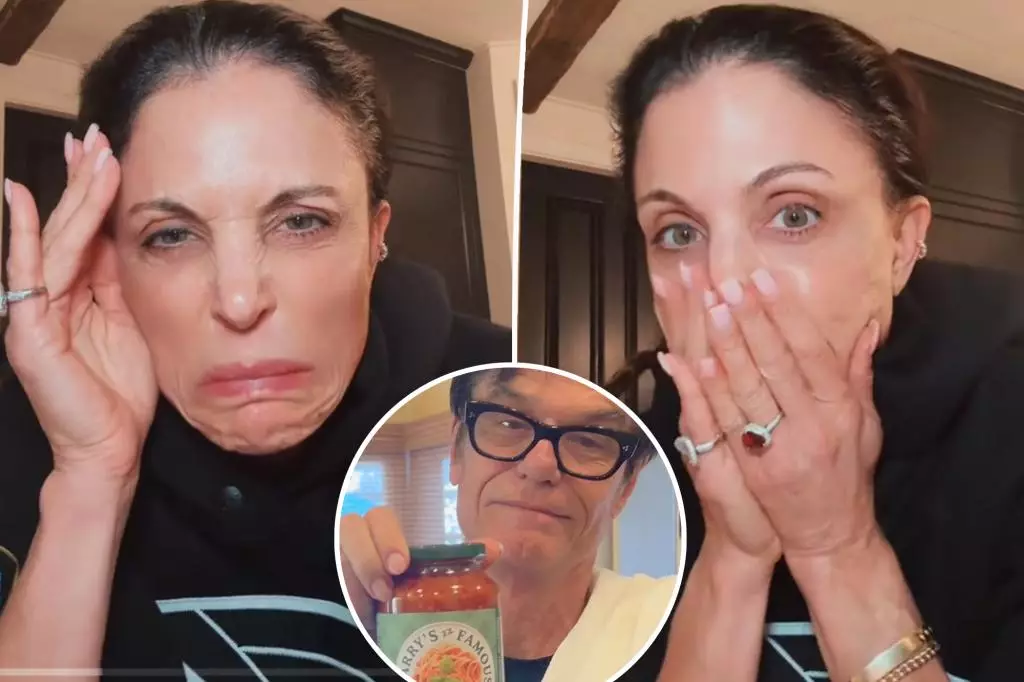In the ever-volatile world of celebrity culture, few things can provoke as much drama as an honest food critique. Recently, Bethenny Frankel, a prominent television personality from “The Real Housewives of New York City,” found herself in the midst of culinary controversy after sampling Harry Hamlin’s pasta sauce—a moment that swiftly became fodder for public amusement and critique on social media. During a blind taste test, Frankel’s immediate and visceral reaction to Hamlin’s rosemary red wine sauce was anything but flattering, sparking discussions about authenticity in celebrity endorsements and the larger implications of taste in culinary products.
The backdrop of this culinary encounter was rather intriguing: Frankel received a beautifully arranged picnic basket, which housed not just any ordinary goodies but also a jar of Hamlin’s Famous Sauce. Frankel, known for her acerbic wit and unfiltered opinions, took to TikTok to document her experience, leading to an abundance of online chatter. Her initial reaction to tasting Rao’s pasta sauce was one of mild approval—she described it as “nice”—but the moment she tasted Hamlin’s offering, her demeanor shifted entirely.
Her candid exclamation of “No! I don’t know what that is!” coupled with a clear distaste painted a humorous yet critical portrayal of the sauce. This stark contrast between expectations and reality is a powerful commentary on the culinary arts, especially in the realm of celebrity-crafted products. Such reactions highlight the expectations set for these high-profile figures who step into the food industry, where taste and quality often bear greater scrutiny than in traditional markets.
Frankel’s review did not go unnoticed, igniting a flurry of comments from viewers and some of Hamlin’s family members. Amelia Gray, the daughter of Hamlin and his wife, Lisa Rinna, quipped that the sauce needed to be cooked to reveal its true flavor. In response, Frankel took another stab at the sauce, this time warming it up and pairing it with pasta. Unfortunately for Hamlin, her second round yielded an even harsher critique—she described it as tasting like “not great red wine.” This moment encapsulates the dual-edged sword of social media; individual critiques can quickly become collective judgments, forever altering public perception of a product.
Interestingly, Frankel openly expressed regret for her harsh review, stressing that neither she nor her assistant intended to be rude. This highlights another layer of complexity in the food critique landscape: the balance between honesty and tact. Celebrity endorsements can sometimes create unrealistic expectations for product quality, and when those expectations are shattered through a public platform, the fallout can be significant.
The Culinary Identity of Harry Hamlin
Hamlin’s identity as a cook extends beyond mere celebrity; he has justified his culinary creation by stating that it is made with “love and more love,” integrating wholesome ingredients without preservatives. His dedication to quality ingredients has earned him respect, culminating in a cooking show, “In The Kitchen With Harry,” which reinforces his culinary credibility. Such a backstory creates an interesting dynamic; while Frankel’s reaction may be seen as detrimental, it also propels discussions around the authenticity and motivations behind celebrity food products.
Hamlin’s goal of delivering a personal touch, which he outlines through his incorporation of items like organic rosemary and honey, stands in stark contrast to Frankel’s critique. This chasm serves as a reminder that not all culinary endeavors will please every palate, especially in a world where taste is subjective and highly personal.
The Broader Implications
The exchange between Frankel and Hamlin showcases the peculiar intersection of celebrity culture and food entrepreneurship, which has become increasingly relevant in today’s context. As celebrities branch into the culinary domain, their creations are often subject to harsh criticism—not only from professional chefs but also from the public, through platforms like TikTok. Frankel’s candid commentary illustrates the risks involved when star power meets the world of gastronomy, ultimately underscoring the significant challenge that celebrities face: to ensure that their culinary offerings meet the high expectations set by their fame.
Frankel’s critique may have stung, but it provided invaluable insight into the complex relationship between celebrity endorsements and consumer expectations. As culinary culture continues to evolve, the conversations sparked by such encounters will undoubtedly serve as critical reflections for both creators and consumers in the industry.

